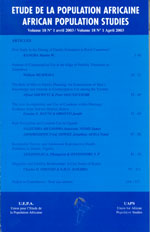
|
African Population Studies
Union for African Population Studies
ISSN: 0850-5780
Vol. 28, No. 2s, 2014, pp. 1057-1071
|
 Bioline Code: ep14050
Bioline Code: ep14050
Full paper language: English
Document type: Research Article
Document available free of charge
|
|
|
African Population Studies, Vol. 28, No. 2s, 2014, pp. 1057-1071
| en |
Male Circumcision and Risky Sexual Behavior in Zimbabwe: Evidence from the 2010-11 Zimbabwe Demographic and Health Survey
Chikutsa, Antony; Ncube, Alfred C. & Mutsau, Shephard
Abstract
In 2009, Zimbabwe adopted voluntary medical male circumcision (VMMC) as an additional method of HIV prevention. The promotion of VMMC has raised a major concern that it might lead to an increase in high-risk sexual behavior, a phenomenon known as risk compensation or behavioral disinhibition. This study sought to test whether circumcised men in Zimbabwe are more likely to have engaged in risky sexual behavior. The study used data collected from 7,480 men age 15-54 who were interviewed during the 2010-11 Zimbabwe Demographic and Health Survey (ZDHS). Logistic regression was used to assess the association between circumcision and risky sexual behaviors. The study found no statistically significant association between male circumcision and risky sexual behavior. These results suggest a need to continue monitoring the relationships between ongoing VMCC campaigns and men’s risky sexual behavior. Information dissemination on VMMC should emphasize caution in messages promoting medical male circumcision to avoid giving the impression that it provides immunity against HIV.
Keywords
HIV Prevention; voluntary medical male circumcision; risky sexual behaviour
|
| |
| fr |
Chikutsa, Antony; Ncube, Alfred C. & Mutsau, Shephard
Résumé
En 2009, le Zimbabwe a adopté la circoncision masculine médicale volontaire (CMMV) comme méthode
additionnelle de prévention du VIH-sida. L’interrogation que suscitait la promotion de la CMMV était son
incidence possible sur l’augmentation des comportements sexuels à risque connue comme phénomène de
compensation du risque ou désinhibant. À partir de données collectées auprès de 7480 hommes âgés de 15-
54 ans lors de l’Enquête Démographique et de Santé de 2010 du Zimbabwe, l’étude examine si les hommes
circoncis sont plus à même d’avoir des comportements sexuels à risque. Les résultats issus de la régression
logistique montrent une association statistiquement non significative entre la circoncision et le
comportement sexuel à risque. Ils suggèrent toutefois la nécessité de maintenir la vigilance sur l’effet
éventuel des campagnes de CMMV sur les comportements sexuels à risque. Les informations qui font la
promotion de cette méthode se doivent de souligner qu’elle ne constitue pas une immunisation contre le VIHsida.
Mots Clés
prévention du VIH-sida; circoncision masculine médicale volontaire; comportements sexuels à risque
|
| |
© Copyright 2014 - African Population Studies
Alternative site location: http://www.uaps-uepa.org
|
|
